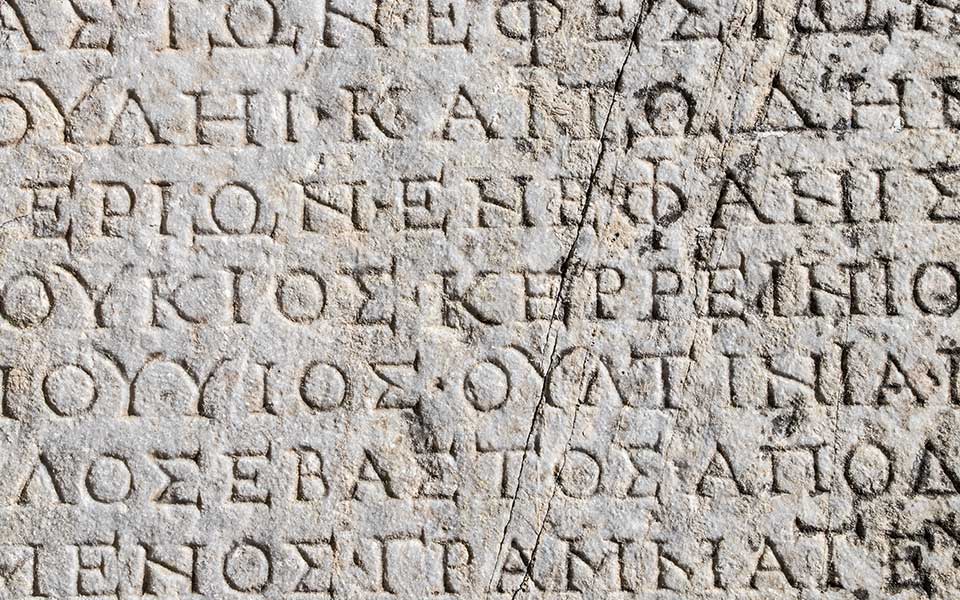Ancient Greek Treasures Return Home from New York
Twenty-nine rare antiquities spanning 5,000 years…

The Greek language, in its various forms, has been in use for around 4,000 years.
© Shutterstock
International Greek Language Day, observed on February 9th, highlights the extraordinary role that the Greek language has played in the global development of literacy, science, philosophy and culture.
Officially launched in 2017 to coincide with the annual commemoration of Greece’s national poet, Dionysios Solomos (April 8, 1798 – February 9, 1857), author of the 1823 poem “Hymn to Liberty” – Greece’s national anthem – International Greek Language Day aims to promote awareness of the language’s unparalleled influence on other writing systems around the world.
To commemorate the day, the Greek Ministry of Foreign Affairs posted the above video on YouTube – “Things you didn’t know about the Greek language” – including messages of support from Andreas Katsaniotis, Deputy Minister for Diaspora Greeks, and John Chrysoulakis, Secretary General for Greek Abroad and Public Diplomacy.
As the world’s oldest recorded living language, spoken in the same geographical region for around 4,000 years, Greek words have been absorbed into many other Indo-European languages, including English, French and Italian. Around 10% of Spanish words, for example, are borrowed from Greek.
To quote French classicist and writer, Jacqueline de Romilly (1913-2010): “Everyone has to learn Greek, because it is through Greek that one can understand one’s own language.”
The sheer depth and richness of the Greek language, with its vast and poetic vocabulary (5 million words and 70 million word types!), provides the perfect tool to define and express complex thoughts and emotions. Indeed, when English speakers run into difficulty trying to find a more precise way to express an idea or describe an object, the oft-used phrase “the Greeks have a word for it” is a convenient way to get off the hook.
The modern Greek language, spoken today by some 13.5 million people in Greece, Cyprus, Albania, Italy, Turkey and among the global Greek diaspora, evolved from ancient Greek, a historical unity that stretches back to the epics of Homer and Hesiod in the 8th century BC.
Ancient Greek, which split into several regional dialects, was an early lingua franca that spread across the Mediterranean world through seaborne trade and colonization. Its alphabet, derived from the earlier Phoenician, is the earliest known alphabetic script to employ distinct letters for vowels and consonants. The Latin alphabet, the most widely used writing system in the modern world, was originally derived from Cumaean Greek, a dialect from ancient Euboea.
The power and influence of the ancient Greek language continued long after the Romans exercised complete political control of the Mediterranean, prompting the philosopher and politician Marcus Tullius Cicero to famously remark: “If the Gods speak, they will surely use the language of the Greeks.”
Today, the Greek language serves as a foundational language in science, mathematics, logic and philosophy, as well as theater and the arts. Around 80% of scientific terms have a Greek root, and Greek letters are a constant source of technical symbols and labels in medicine, engineering, astronomy, and other fields.
At its core, Greek is the root language of freedom and democracy (“people rule”), the brave new system of government that emerged out of the political and philosophical discourse in ancient Athens two and a half thousand years ago. Athenian democracy, developed, debated and endlessly critiqued by the city’s great lawmakers and thinkers, inlcuding Solon, Cleisthenes, Pericles and Plato, forms the bedrock of modern liberal democracy, the dominant political system in the world.
Happy International Greek Language Day!
Twenty-nine rare antiquities spanning 5,000 years…
A team of researchers has scaled…
Greece's Ministry of Culture and the…
Were they places of ancient worship,…